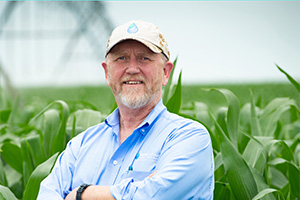Letter from the Executive Director

As we continue to navigate through this global pandemic, the mission of the Daugherty Water for Food Global Institute (DWFI)—to secure more nutritious food with less stress on our scarce water resources—is more relevant and urgent than ever. We must expand and accelerate efforts to produce more nutritious food with less water; catalyze the development and deployment of solutions to the next generation of producers, water managers and entrepreneurs; strengthen water and food systems to adapt to water-related shocks; and reverse the wide-spread trend of water quality degradation.
This past year required us all to find ways to adapt to constraints on how we work and highlighted the importance of our network of committed partners. Students, faculty fellows, university leaders, producers, water managers and other stakeholders—both here and around the world—have developed creative ways to adjust to the challenges brought on by the recurring waves of the pandemic.
As I read through the following annual report, I am struck by what has been achieved in the past year. However, it is not our accomplishment alone. We thank all who have contributed to our success, especially in the midst of a particularly difficult landscape. Specific highlights include:
- the roll-out of the Water, Climate and Health (WCH) program, a collaboration between the University of Nebraska Medical Center College of Public Health, the University of Nebraska–Lincoln (UNL) Institute of Agriculture and Natural Resources (IANR) and DWFI;
- the launch of the Drought, Water and Economics project, a team comprised of staff from the National Drought Mitigation Center (NDMC), the UNL Department of Agricultural Economics and DWFI, with support from the Office of the Chief Economist at the U.S. Department of Agriculture (USDA);
- tthe allocation of $500,000 annually to DWFI in the Nebraska state budget for water research, advancing the institute’s work in Nebraska to improve water quality, enhance agricultural water management, predict and mitigate extreme events and sustain our valuable water resources;
- continued progress in addressing water quality degradation, including a strategic collaboration within the Bazile Groundwater Management Area (BGMA), and helping convene the state-wide nitrate strategy group;
- further application and development of our suite of decision-support tools, including upgrading several eddy covariance towers to measure nitrous oxide and methane; significant new grants from the Department of Energy and USDA; and,
- the launch of an important smallholder irrigation project, supported by the International Fund for Agricultural Development (IFAD). I am especially delighted by the efforts of our team of young Rwandan professionals, most of whom have recently completed degrees here at the University of Nebraska–Lincoln and are now implementing the program in Rwanda.
While in-person events and travel were not safely possible, we focused on hosting and supporting virtual events that supported our efforts on achieving impact. We were heartened that participation expanded to those who may not have been able to join us in the past, especially those overseas, including many small producers and ag-entrepreneurial startups. We look forward to building on this experience through our Water for Food Global Forum planned for October 2021, which also will be primarily virtual.
Despite the challenges and constraints, it has been a productive year, which would not have been possible without our partners. Moving forward, we will continue to adjust to the new normal in our work environment and adapt to a changing environment. We look forward to developing more productive and resilient water for food systems and, sooner than later, getting to do so in person.
Regards,

Executive Director
Daugherty Water for Food Global Institute
ANNUAL REPORT 2021
- Overview
- Letter from the Executive Director
-
Research and Projects
-
Global and National
- DWFI Leads Smallholder Sustainable Irrigation Entrepreneurship Project in Sub-Saharan Africa
- New Agricultural Water Economics Team Advances Water Policy
- Small Rwandan Agribusiness Entrepreneurs Work in New Ways Following COVID-19 Restrictions
- Future Farming: Integrated Water Management Leads to Profitability and Sustainability
- Modeling Brazilian Aquifer Will Help Farmers Maximize Crop Water Productivity
- DWFI experts contribute to FAOs State of Food and Agriculture 2020
-
Nebraska
- Hub Brings Together Faculty for Greater Impact in Water and Cropping Systems
- Researchers Explore Potential AltEn Ethanol Plant Contamination Effects on Local Residents
- Impact of Covid-19 on Midwest Agtech Entrepreneurship
- Nebraska Nitrate Working Groups Tackle Persistent Drinking Water Contamination
- Nebraska Smart Farms Drive Technology Adoption
-
Faculty Fellows and Supported Students
- DWFI Welcomes Eight New Faculty Fellows
- DWFI Funds Research of 10 New Students in Food and Water Security
- Water for Food Student Impact Workshop and Research Forum
- Investigating Climate’s Influence on Atrazine Groundwater Contamination
- Sustainable Water Management: Solving the Mystery of Nebraska’s Intricate Aquifer System
- Drones Provide Detailed Picture of Wetland Health
- Understanding Corn Ear Abnormalities to Close Yield Gaps
- Examining the Effects of Agrichemical Contaminants on Pediatric Cancers
-
Global and National
-
Education
- Virtual Webinar Series Attracts Various Audiences
- One Health Webinar Series Discusses Health and Well-being of Humans Animals and the Environment
- Water and Health Summit Brings Together Leaders to Clarify Issues in Nebraska, Define Solutions
- NWC Hosts Virtual Mini-Conference
- Policy Team Leads Student Course on Securing and Sustaining Water for Food Globally
- Plans for Water for Food Global Forum Underway
- Regional Event Localizes Findings of the 2020 Lancet Countdown Report
- Communication
- Development and Organizational Sustainability
- Resources
- Search
ANNUAL REPORT 2021
- Overview
- Letter from the Executive Director
-
Research and Projects
-
Global and National
- DWFI Leads Smallholder Sustainable Irrigation Entrepreneurship Project in Sub-Saharan Africa
- New Agricultural Water Economics Team Advances Water Policy
- Small Rwandan Agribusiness Entrepreneurs Work in New Ways Following COVID-19 Restrictions
- Future Farming: Integrated Water Management Leads to Profitability and Sustainability
- Modeling Brazilian Aquifer Will Help Farmers Maximize Crop Water Productivity
- DWFI experts contribute to FAOs State of Food and Agriculture 2020
-
Nebraska
- Hub Brings Together Faculty for Greater Impact in Water and Cropping Systems
- Researchers Explore Potential AltEn Ethanol Plant Contamination Effects on Local Residents
- Impact of Covid-19 on Midwest Agtech Entrepreneurship
- Nebraska Nitrate Working Groups Tackle Persistent Drinking Water Contamination
- Nebraska Smart Farms Drive Technology Adoption
-
Faculty Fellows and Supported Students
- DWFI Welcomes Eight New Faculty Fellows
- DWFI Funds Research of 10 New Students in Food and Water Security
- Water for Food Student Impact Workshop and Research Forum
- Investigating Climate’s Influence on Atrazine Groundwater Contamination
- Sustainable Water Management: Solving the Mystery of Nebraska’s Intricate Aquifer System
- Drones Provide Detailed Picture of Wetland Health
- Understanding Corn Ear Abnormalities to Close Yield Gaps
- Examining the Effects of Agrichemical Contaminants on Pediatric Cancers
-
Global and National
-
Education
- Virtual Webinar Series Attracts Various Audiences
- One Health Webinar Series Discusses Health and Well-being of Humans Animals and the Environment
- Water and Health Summit Brings Together Leaders to Clarify Issues in Nebraska, Define Solutions
- NWC Hosts Virtual Mini-Conference
- Policy Team Leads Student Course on Securing and Sustaining Water for Food Globally
- Plans for Water for Food Global Forum Underway
- Regional Event Localizes Findings of the 2020 Lancet Countdown Report
- Communication
- Development and Organizational Sustainability
- Resources
- Search
Search More Articles
Search the 2021 Annual Report for more articles.
COOKIE USAGE:
The University of Nebraska System uses cookies to give you the best online experience. By clicking "I Agree" and/or continuing to use this website without adjusting your browser settings, you accept the use of cookies.

